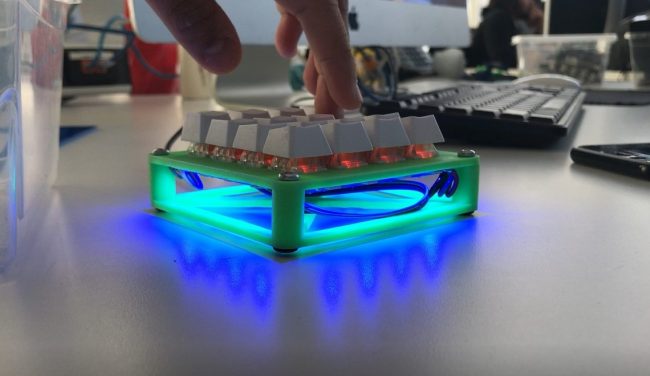 Fourth year student Charles Garcia lights up his own mini keypads at the Library’s DME
Fourth year student Charles Garcia lights up his own mini keypads at the Library’s DME
Throughout his undergraduate studies, fourth-year computer engineering student Charles Garcia has made the most of the opportunities available to students at the Library’s Isaac Olowolafe Jr. Digital Media Experience Lab (DME). The DME is a student academic hub that offers digital literacy workshops, and experiential learning programming. In the summer of 2018, after researching and building his own small-scale keypad prototype at the DME, Garcia started developing his own workshops to teach other students how to do the same. He’s now facilitated two pilot mini keypad workshops, and will launch his first official workshop at the DME on April 29, 2019.
Why did you start making mini keypads?
Originally the keypad was created to fulfill a small need of my own: a small, portable gaming keypad for a game I played during my first year at university. As time went on, I spent less time gaming; however, I was still interested in the process of creating mini keypads—3D-modeling/printing, firmware programming and basic circuit design. I continued creating the keypads as a way to keep updating my skills, which led to more keypads and keyboards. It is now a hobby that allows me to keep making small improvements to each small project.
How did you make the first keypad?
The original keypad was built using a USB-capable Arduino (Leonardo, Micro, and Teensy) attached to four keyboard buttons, enclosed in a 3D-printed case. Not much has fundamentally changed since then, other than the refinement of the keypad design including incremental improvements in firmware (Arduino code), the use of circuit boards over wires, differing numbers of buttons, and lighting effects.
This project is really innovative. Where and how did you acquire the skills to develop the keypad?
I can’t say that this was an original idea. Logitech and other hardware manufacturers are further ahead of me in terms of innovation.
Most of the knowledge I‘ve gained has been based on research. I’ve spent hours going through online forums, datasheets and tutorials, in addition to the support at the DME. I’ve also had to learn and update skill sets in order to implement the keypad, such as programming, soldering, and 3D modeling. I learned these skills in order to minimize research costs and create meaningful progress for these projects. Even re-implementing a current design requires plenty of research and self-education. The DME has and continues to be, very supportive. I cannot thank them enough for their support and the resources given to me.
What can participants look forward to at your keypad workshop?
The keypad workshop is a culmination of my experience building keypads designed around teaching basic assembly, soldering and programming skills. Participants will receive a kit containing materials required to build my keypad, instructions from myself, and a GitHub page documenting the build process. The kit has been designed to be simple enough for beginners, but also challenging enough to warrant learning a new set of skills. Experienced builders/programmers can also program the keypad beyond the scope of the workshop to fulfill their own needs.
The kit, when assembled, will be a keypad with eight buttons, lighting circuitry built-in, and can be programmed with effects.
Garcia’s first official mini keypad workshop will be offered on April 29, 2019 at the DME
Students can register at: DIY Macro Keyboard Workshop